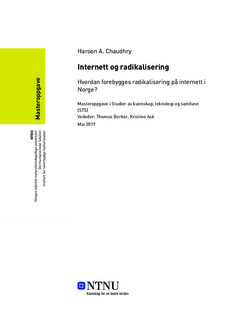| dc.description.abstract | Radikalisering har blitt en økende bekymring i både Norge og internasjonalt. I de senere årene har flere påpekt internett som en viktig kilde til radikalisering. Regjeringen lanserte i 2014 en handlingsplan mot radikalisering og voldelig ekstremisme, som i tillegg til anerkjennelsen av internetts rolle i radikaliseringsprosessen, inneholder flere tiltak som er rettet mot å forebygge radikalisering og rekruttering gjennom internett, og fremhever behovet for aktiv bruk av internett i selve forebyggingsarbeidet.
Denne oppgaven har som hensikt å undersøke hvordan radikalisering forebygges på internett i Norge. Oppgaven ser nærmere på ulike forståelser av internett og dens rolle i radikaliseringsprosesser, samt konkrete forebyggingspraksiser. Analysen baseres på to STS-teorier for å belyse hvordan teknologi forstås og hvordan den tas i bruk: innramming og domestisering. Undersøkelsen foretas med utgangspunkt i kvalitative intervju av fem aktører som på ulike måter jobber med å forebygge radikalisering, samt kvalitative dokumentstudier av politiske dokumenter.
Oppgaven viser at mye av forebyggingsarbeidet i tiltakene skjer offline. De fleste tiltakene tar utgangspunkt i ideen om et kunnnskapsunderskudd og en teknologideterministisk forståelse, hvor enkelte teknologiske fix og det å overføre den «korrekte» informasjonen om teknologien vektlegges mer, enn å jobbe interaktivt online. Videre viser analysen at aktører som jobber med å forebygge radikalisering, rammer inn internetts rolle i radikaliseringsprosessen ulikt. Årsaken bak disse innrammingene er knyttet til faktorer som aktørenes ressurser, forutsetninger og politiske støtte for å ta i bruk internett i selve forebyggingsarbeidet. Mine funn tyder på at domestiseringen av internett i forebyggingsarbeidet på mange måter er mangelfull.
Ut fra disse funnene konkluderer oppgaven med at flere aktører bør få ressurser og politisk støtte for å forebygge på internett, og et større handlingsrom for å domestisere internett i forebyggingsarbeidet. Dette vil både synliggjøre internetts rolle i radikaliseringsprosessen, samt føre til nye strategier og nye muligheter for å forebygge interaktivt online. | |
| dc.description.abstract | Radicalization has become a growing concern in both Norway and internationally. In recent years, it has become widely acknowledged that the Internet is an important site of radicalization. In 2014, the Norwegian government launched an action plan against radicalization and violent extremism, which, in addition to the recognition of Internet in the radicalization process, proposes several measures aimed at preventing radicalization and recruitment through the Internet. Moreover, it highlights the need for the active use of the Internet in the prevention work itself.
This thesis examines how radicalization is prevented in relation to the Internet in Norway. It looks at how the Internet and its role in radicalization processes is understood, as well as at specific prevention practices. The analysis is carried out with the help of two STS theories: framing and domestication. The study is based on qualitative interviews with five actors who, in various ways, work to prevent radicalization, as well as qualitative document studies of political documents.
The findings show that much of the prevention work takes place offline. I show that most of the measures are based on the idea of knowledge deficits and a technology deterministic understanding, where certain technological fixes and the transfer of the "correct" information about the technology are emphasized more than working interactively online. Furthermore, the analysis shows that actors working to prevent radicalization, frame the role of the Internet in the radicalization process differently. The reason behind these framings is related to factors such as the actor’s resources, qualifications and political support for using the Internet in the actual prevention work. Moreover, the analysis shows that domestication of the Internet in the prevention work is in many ways incomplete.
Based on these findings, the thesis concludes that more actors should receive resources and political support to use and domesticate the Internet in their work. This will result both in a better understanding of the role of the Internet in the radicalization process, and lead to new strategies and new opportunities to prevent interactively online. | |
